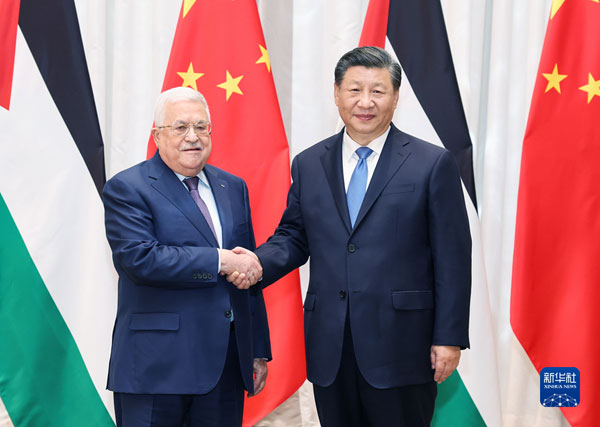The right of Palestinians to a nation state mobilized the European public opinion for decades. Moreover, their persecution by the right-wing and nationalist governments in Israel attracted the sympathy of people worldwide. For many, the Palestinian Question became a synonym for national freedom, the right of self-determination, and respect for human dignity.
However, it seems the Palestinian Authority under President Mahmoud Abbas thinks differently, presumably believing that the Palestinians deserve the treatment of people with special rights. Abbas recently disdained the rights of other oppressed nations in exchange for benefits from a superpower, thus China.
We are talking about the meeting between the Chinese President Xi Jinping and the Palestinian President in Beijing on June 14, 2023, that resulted in upgrading the bilateral relations to a strategic partnership.
China promotes its interests in developing countries through several aid programmes, including public infrastructure. China did so in Palestine. It constructed schools and roads and offered Palestinian Authority experts, medical supplies, and vaccines during the COVID-19 pandemic. Additionally, in June 2023, China committed to a $1 million donation to the Relief and Works Agency for Palestine Refugees in the Near East.
As the situation in Palestine is in stalemate – due to the rise of nationalists in Israel, the preference of Arab States to solidarity rhetoric neglecting real support, the Western sophisticate calculations about the pros and cons, and the inefficiency of the Palestinian Authority – China finds space to deploy its policy. And not only China. Islamic fundamentalism finds fertile ground as well.
What Palestinians offer Xi
But the matter is not what China achieved in Palestine. It is about what the Palestinian Authority agreed to sign and concede to Beijing’s repressive regime.
The two parts issued a joint statement on Wednesday, reiterating mutual support on issues China considers of critical interest.
Palestine declared, of course, that it supports the one-China principle. But, the document Abbas sighed underlines that the Palestine Authority supports all efforts made by the People’s Republic of China (PRC) to achieve national reunification. What does that mean? That, despite its problems in the Middle East, the Palestine Authority will support – we suppose on a moral and not material basis – China in case of an invasion of Taiwan (the Republic of China).
What is astonishing, however, is that the Palestinian Authority also “condemns external interference in China’s internal affairs including Hong Kong and Xinjiang-related” issues.
That means the Palestinians are indifferent to the genocide committed by Xi’s rule since 2014 in Xinjiang against the Uyghurs. It means that the Authority condemns the efforts of democratic states to stop what Beijing does in Xinjiang: concentration camps, tortures, forced marriages, adoptions, and forced labour, among others.
And that the daily persecution and imprisonment of pro-Democracy activists, lawyers, and students in Hong Kong cannot concern the Palestinians.
President Abbas will be ready to implore international support for his case the next time he will speak at the UN, convinced that a considerable part of the international community doesn’t care, doesn’t understand, or forget the atrocity of his act. Or, maybe President Abbas agrees with the Israeli conservatives who consider any support from abroad to Palestinians a foreign interference?
And what did President Abbas obtain from Xi? Promises, good words, and probably new investments for the territory the Authority controls. According to the joint statement, China supports Palestine “in becoming a full member of the UN and resuming peace talks with Israel based on the ‘land for peace’ principle, and the ‘two-state solution'”.
Palestinians act as the rest of the Muslim leaders
However, the agreement between the Palestinian Authority and China is not an exception. Arab and Muslim governments use the rhetoric of solidarity in theory and only when it concerns acts committed in Western countries.
When the economic relations with China and India – and the related benefits – are at risk, the Muslim rulers pretend to ignore the case.
Thus, they are indifferent to the persecution of vast Muslim communities in Myanmar, India, and China.
In Myanmar, the Beijing-backed regime deployed a genocide programme against the Muslims – mainly the Rohingya people – causing an unprecedented refugee movement: over a million found refuge in neighbouring countries. Many villages were destroyed, tens of thousands of girls and women were raped, and more than 25,000 people were killed.
The Arab world, and generally the Muslim governments, remained cold-hearted.
In India, Prime Minister Narendra Modi‘s Hindu nationalist agenda induces systematic persecution of Muslims. However, the Arab states refuse to react, preferring lucrative affairs with the “illiberal democracy” of India.
It is the same with the case of the Uyghurs. None of their “brothers” in the Arab world or even in Central Asia – among the persecuted Muslims in China are also the members of the Kazakh minority – defended their fundamental rights during the meetings with the Chinese leaders.
With such cynical behaviour the Muslim leadership compromised the fight against Islamophobia in Europe. By signing the joint statement with Xi, Abbas compromised the fight of Palestinians for an independent state.

